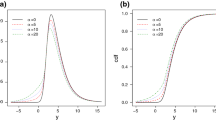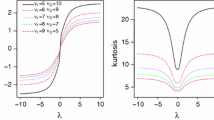Abstract
In this paper, the shape mixtures of the skew Laplace normal (SMSLN) distribution is introduced as a flexible extension of the skew Laplace normal distribution which is also a heavy-tailed distribution. The SMSLN distribution includes an extra shape parameter, which controls skewness and kurtosis. Some distributional properties of this distribution are derived. Besides, we propose finite mixtures of SMSLN distributions to model both skewness and heavy-tailedness in heterogeneous data sets. The maximum likelihood estimators for parameters of interests are obtained via the expectation–maximization algorithm. We also give a simulation study and examine a real data example for the numerical illustration of proposed estimators.





Similar content being viewed by others
References
Akaike H (1973) Information theory and an extension of the maximum likelihood principle. In: Petrov BN, Caski F (eds) Proceeding of the second international symposium on information theory. Akademiai Kiado, Budapest, pp 267–281
Azzalini A (1985) A class of distributions which includes the normal ones. Scand J Stat 12(2):171–178
Azzalini A (1986) Further results on a class of distributions which includes the normal ones. Statistica 46(2):199–208
Azzalini A with the collaboration of Capitanio A (2014) The skew-normal and related families, IMS monographs. Cambridge University Press, Cambridge
Azzalini A, Capitanio A (2003) Distributions generated by perturbation of symmetry with emphasis on a multivariate skew t distribution. J R Stat Soc Ser B Stat Methodol 65(2):367–389
Bai ZD, Krishnaiah PR, Zhao LC (1989) On rates of convergence of efficient detection criteria in signal processing with white noise. IEEE Trans Inf Theory 35:380–388
Basford KE, Greenway DR, McLachlan GJ, Peel D (1997) Standard errors of fitted means under normal mixture. Comput Stat 12:1–17
Basso RM, Lachos VH, Cabral CRB, Ghosh P (2010) Robust mixture modeling based on scale mixtures of skew-normal distributions. Comput Stat Data Anal 54(12):2926–2941
Bishop CM (2006) Pattern recognition and machine learning. Springer, Singapore
Cabral CRB, Bolfarine H, Pereira JRG (2008) Bayesian density estimation using skew student-t-normal mixtures. Comput Stat Data Anal 52(12):5075–5090
Cabral CRB, Lachos VH, Prates MO (2012) Multivariate mixture modeling using skew-normal independent distributions. Comput Stat Data Anal 56(1):126–142
Chen J, Tan X, Zhang R (2008) Inference for normal mixtures in mean and variance. Stat Sin 18(2):443–465
Dempster AP, Laird NM, Rubin DB (1977) Maximum likelihood from incomplete data via the EM algorithm. J R Stat Soc B 39:1–38
Dias JG, Wedel M (2004) An empirical comparison of EM, SEM and MCMC performance for problematic gaussian mixture likelihoods. Stat Comput 14:323–332
Doğru FZ, Arslan O (2017) Parameter estimation for mixtures of skew Laplace normal distributions and application in mixture regression modeling. Commun Stat Theory Methods 46(21):10879–10896
Doğru FZ, Arslan O (2019) Joint modelling of the location, scale and skewness parameters of the skew Laplace normal distribution. Iran J Sci Technol Trans A Sci 43(3):1249–1257
Doğru FZ, Yu K, Arslan O (2019) Heteroscedastic and heavy-tailed regression with mixtures of skew Laplace normal distributions. J Stat Comput Simul 89(17):3213–3240
Doğru FZ, Bulut YM, Arslan O (2020) Finite mixtures of multivariate skew laplace distributions. REVSTAT Stat J (forthcoming paper)
Frühwirth-Schnatter S (2006) Finite mixture and Markov switching models. Springer, NewYork
Frühwirth-Schnatter S, Pyne S (2010) Bayesian inference for finite mixtures of univariate and multivariate skew-normal and skew-t distributions. Biostatistics 11(2):317–336
Glynn EF (2006) Fcsextract utility. Stowers Institute for Medical Research. [Online]. http://research.stowers-institute.org/efg/ScientificSoftware/Utility/FCSExtract
Gómez HW, Venegas O, Bolfarine H (2007) Skew-symmetric distributions generated by the distribution function of the normal distribution. Environmetrics 18:395–407
Hahne F, LeMeur N, Brinkman RR, Ellis B, Haaland P, Sarkar D, Spidlen J, Starin E, Gentleman R (2009) flowCore: a bioconductor package for high throughput flow cytometry. BMC Bioinform 10(1):106
Hathaway RJ (1985) A constrained formulation of maximum-likelihood estimation for normal mixture distributions. Ann Stat 13(2):795–800
Henze N (1986) A probabilistic representation of the skew-normal distribution. Scan J Stat 13(4):271–275
Ho H, Pyne S, Lin T (2012) Maximum likelihood inference for mixtures of skew student-t-normal distributions through practical EM-type algorithms. Stat Comput 22(1):287–299
Holzmann H, Munk A, Stratmann B (2004) Identifiability of finite mixtures—with applications to circular distributions. Sankhya 66:440–449
Holzmann H, Munk A, Gneiting T (2006) Identifiability of finite mixtures of elliptical distributions. Scand J Stat 33(4):753–763
Kent JT (1983) Identifiability of finite mixtures for directional data. Ann Stat 11:984–988
Lin TI (2009) Maximum likelihood estimation for multivariate skew normal mixture models. J Multivar Anal 100:257–265
Lin TI (2010) Robust mixture modeling using multivariate skew t distributions. Stat Comput 20(3):343–356
Lin TI, Lee JC, Hsieh WJ (2007a) Robust mixture modeling using the skew t distribution. Stat Comput 17:81–92
Lin TI, Lee JC, Yen SY (2007b) Finite mixture modelling using the skew normal distribution. Stat Sin 17(3):909–927
Lin TI, Ho HJ, Lee CR (2014) Flexible mixture modelling using the multivariate skew-t-normal distribution. Stat Comput 24(4):531–546
McLachlan GJ, Basford KE (1988) Mixture models: inference and application to clustering. Marcel Dekker, New York
McLachlan GJ, Krishnan T (2008) The EM algorithm and extensions, 2nd edn. Wiley, New York
McLachlan GJ, Peel D (2000) Finite mixture models. Wiley, New York
Peel D, McLachlan GJ (2000) Robust mixture modelling using the t distribution. Stat Comput 10(4):339–348
Pyne S, Hu X, Wang K, Rossin E, Lin TI, Maier L, Baecher-Allan C, McLachlan GJ, Tamayo P, Hafler DA, De Jager PL, Mesirov JP (2009) Automated high-dimensional flow cytometric data analysis. Proc Natl Acad Sci 106(21):8519–8524
Sahu SK, Dey DK, Branco MD (2003) A new class of multivariate skew distributions with applications to Bayesian regression models. Can J Stat 31(2):129–150
Schwarz G (1978) Estimating the dimension of a model. Ann Stat 6(2):461–464
Smirnov NV (1948) Table for estimating the goodness of fit of empirical distributions. Ann Math Stat 19(2):279–281
Tamandi M, Jamalizadeh A (2020) Finite mixture modeling using shape mixtures of the skew scale mixtures of normal distributions. Commun Stat Simul Comput (in press)
Tamandi M, Jamalizadeh A, Lin TI (2019) Shape mixtures of skew-t-normal distributions: characterizations and estimation. Comput Stat 34(1):323–347
Teicher H (1961) Identifiability of mixtures. Ann Math Stat 32:244–248
Teicher H (1963) Identifiability of finite mixtures. Ann Math Stat 34:1265–1269
Titterington DM, Smith AFM, Markov UE (1985) Statistical analysis of finite mixture distributions. Wiley, New York
Wei Y (2012) Robust mixture regression models using t-distribution. Master Report, Department of Statistics, Kansas State University
Yakowitz SJ, Spragins JD (1968) On the identifiability of finite mixtures. Ann Math Stat 39:209–214
Yao W (2010) A profile likelihood method for normal mixture with unequal variance. J Stat Plan Inference 140(7):2089–2098
Acknowledgements
The authors thank two anonymous referees and the associate editor for their thoughtful suggestions that greatly improved the paper.
Author information
Authors and Affiliations
Corresponding author
Additional information
Publisher's Note
Springer Nature remains neutral with regard to jurisdictional claims in published maps and institutional affiliations.
Appendices
Appendix A. Identifiability of the mixture model
We will give the following identifiability theorem for the general case of mixture modeling.
Theorem A1
If \( {\mathcal{H}} = \left\{ {\mathop \sum \limits_{i = 1}^{g} w_{i} F_{i} \left( {y;{\varvec{\Theta}}} \right), w_{i} \ge 0,\mathop \sum \limits_{i = 1}^{g} w_{i} = 1} \right\} \) of all finite mixtures of the finite family \( {\mathcal{F}} = \left\{ {F_{1} \left( y \right),F_{2} \left( y \right), \ldots ,F_{g} \left( y \right)} \right\} \) is identifiable, there is a \( g \) real values \( y_{1} ,y_{2} , \ldots ,y_{g} \) for the determinant of \( F_{i} \left( {y_{j} } \right), 1 \le i,j \le g \). Let \( {\mathcal{F}} = \left\{ F \right\} \) be a family of c.d.f’s with transformation \( \psi \left( t \right) \) for \( t \in S_{\psi } \) (the domain of definition of characteristic function) which the mapping \( M:F \to \phi \) is linear. Assume that there is a total ordering \( { \preccurlyeq } \) of \( {\mathcal{F}} \) that \( F_{1} \prec F_{2} \) shows
-
(i)
\( S_{{\psi_{1} }} \subseteq S_{{\psi_{2} }} \),
-
(ii)
for some \( t \in \bar{S}_{{\psi_{1} }} \), \( \mathop {\lim }\limits_{{t \to t_{1} }} \frac{{\psi_{2} \left( t \right)}}{{\psi_{2} \left( t \right)}} = 0 \), where \( t_{1} \) is independent of \( \psi_{2} \).
Then the class \( {\mathcal{H}^{\prime}} \) of all finite mixtures of \( {\mathcal{F}} \) is identifiable.
Proof of the Theorem A1
We prove the Theorem A1 following the identifiability procedure given by Teicher (1961,1963) and Yakowitz and Spragins (1968). One can also see the papers by Kent (1983), Holzmann et al. (2004), and Holzmann et al. (2006) for further details about identifiability.□
Let \( {\mathcal{F}} = \left\{ {F\left( {y;{\varvec{\Theta}}} \right),{\varvec{\Theta}} \in R^{m} } \right\} \) be a family of one-dimensional cumulative distribution functions (c.d.f.’s) that \( F\left( {y;{\varvec{\Theta}}} \right) \) is measurable in \( R^{1} \times R_{1}^{m} \) where \( R_{1}^{m} \) is a Borel subset in Euclidian \( m \)-space \( R^{m} \). The image under the mapping \( {\tilde{\mathcal{F}}} \) can be represented by
where \( G \) is the \( m \)-dimensional c.d.f. and \( H \) is a \( G \)-mixture of \( {\mathcal{F}} \). Let \( {\mathcal{H}} \) be the induced class of mixtures and \( {\mathcal{G}} \) be the class of all \( m \)-dimensional c.d.f.’s \( G \). Let \( {\mathcal{H}}_{g} \) and \( {\mathcal{H}^{\prime}} \), \( g = 1,2, \ldots \) be the induced classes of finite mixtures.
Assume that there are two finite sets of elements of \( {\mathcal{F}} \) with \( {\mathcal{F}}_{1} = \left\{ {F_{i} ,1 \ge i \le g} \right\} \) and \( {\mathcal{F}}_{2} = \left\{ {F_{i}^{*} ,1 \ge i \le g^{*} } \right\} \) which hold
where \( 0 < w_{i} ,w_{i}^{*} \le 1 \) and \( \mathop \sum \nolimits_{i = 1}^{g} w_{i} = \mathop \sum \nolimits_{i = 1}^{{g^{*} }} w_{i}^{*} = 1 \). It can be written that \( F_{i} \prec F_{j} , F_{i}^{*} \prec F_{j}^{*} \) for \( i < j \). Assume that \( F_{1} \prec F_{1}^{*} \) if \( F_{1} \ne F_{1}^{*} \). Next \( F_{1} \prec F_{j}^{*} , 1 \le j \le g^{*} \) and after transforming (40) for \( t \in T_{1} = S_{{\psi_{1} }} .\left[ {t:\psi_{1} \left( t \right) \ne 0} \right] \)
When \( t \to t_{1} \) in \( T_{1} \), \( w_{1} = 0 \), it conflicts with (40) that \( w_{1} > 0 \). Then, \( F_{1} = F_{1}^{*} \) and for any \( t \in T_{1} \)
After then, when \( t \to t_{1} \) in \( T_{1} \), \( w_{1} = w_{1}^{*} \), thus,
Making this reputation for the finite number of times, we get that \( F_{i} = F_{i}^{*} \) and \( w_{i} = w_{i}^{*} \) for \( i = 1,2, \ldots ,\hbox{min} \left( {g,g^{*} } \right) \). Also, if \( g \ne g^{*} \), suppose that \( g > g^{*} \) and \( \mathop \sum \nolimits_{{i = g^{*} + 1}}^{g} w_{i} F_{i} \left( {y;\mu_{i} ,\sigma_{i}^{2} ,\lambda_{i} ,\alpha_{i} } \right) \equiv 0 \) claims that \( w_{i} = 0, g^{*} + 1 \le i \le g \) in contrast to (40). As a consequence, \( g = g^{*} , w_{i} = w_{i}^{*} \) and \( F_{i} = F_{i}^{*} , 1 \le i \le g \), shows that \( {\mathcal{F}}_{1} = {\mathcal{F}}_{2} \) and they are identifiable on \( {\mathcal{H}^{\prime}} \).
Appendix B. The steps of computing KS test statistic
-
1.
Sort data in ascending order \( y_{\left( 1 \right)} \le y_{\left( 2 \right)} \le \cdots \le y_{\left( n \right)} \).
-
2.
Calculate the KS test statistic using the following formula:
where \( \hat{F}\left( \cdot \right) \) is the fitted cdf of a specific distribution which should be continuous.
We note that we compute the cdf values of the mixture models given in Sect. 4.2 using the integral function in MATLAB R2017b software for calculating of the KS statistics.
Rights and permissions
About this article
Cite this article
Doğru, F.Z., Arslan, O. Finite mixtures of skew Laplace normal distributions with random skewness. Comput Stat 36, 423–447 (2021). https://doi.org/10.1007/s00180-020-01025-8
Received:
Accepted:
Published:
Issue Date:
DOI: https://doi.org/10.1007/s00180-020-01025-8




